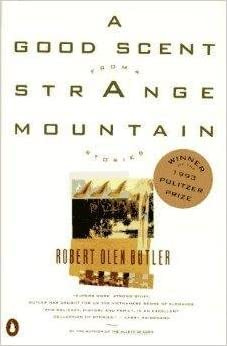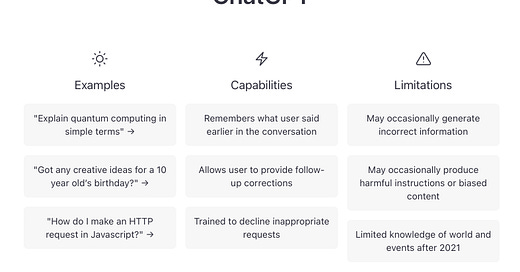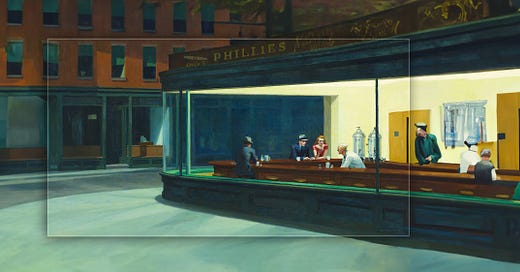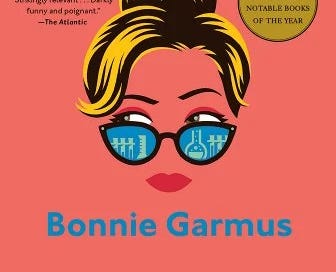
The Pulitzer Prize awards, including the fiction prize, will be announced tomorrow. I have a long history of incorrectly predicting the winner, a track record I am eager to extend by incorrectly predicting this year’s prize.
Before I do that, however, I’m going to predict next year’s fiction’s prize: James by Percival Everett. I can’t think of a better example of “distinguished fiction published during the year by an American author, preferably dealing with American life,” the stated criteria for the prize.
Twenty-twenty-four, however, is murkier in my mind. Part of it is that the criteria is so broad, and occasionally ignored, that it offers little chance to narrow the field other than it has to be a book by an American writer.
The other part is that sometimes wildcard choices pop out of seemingly nowhere. The 2022 winner, The Netanyahus by Joshua Cohen would not have been on many radars. Same for Less in 2018, The Orphan Master’s Son in 2013, and Tinkers in 2010.
The method by which the winner is determined is also somewhat unique. A three-person panel chooses three finalists and a recommended winner that is then subject to either affirmation or change by the full Pulitzer board. If it’s public knowledge who is on that panel prior to the award announcement, it’s not something I can find. And sometimes the board just decides the panel got it wrong and decides not to give out the award, as happened in 2012, and most famously in 1974 when they couldn’t bring themselves to give the prize to Thomas Pynchon’s “obscene” Gravity’s Rainbow.
Does it feel like I’m giving myself an out for the inevitable wrongness of my predictions?
It should, because that’s what I’m doing.
Back in 2022 when there were 200% fewer readers of the newsletter I explored the question of what literary prizes mean and the answer is both nothing and everything.1
First, a little poll that’s only fun if you guess without looking up the answer.
Strong Contenders That Aren’t Going to Win
The Morning News Tournament of Books has a pretty solid track record of predicting the Pulitzer, considering how it’s impossible to predict the Pulitzer. Both of this year’s finalists, Blackouts by Justin Torres and The Heaven and Earth Grocery Store by James McBride have to be looked at as strong possibilities.
Neither is going to win, however. Blackouts has already won the National Book Award (in addition to the Tournament of Books), and NBA winners rarely double up with a Pulitzer. The last time in happened was The Shipping News by Annie Proulx in 1994.
As for The Heaven and Earth Grocery Store, it’s a very good book, but it’s also McBride’s third best novel behind The Good Lord Bird and Deacon King Kong, so I don’t think it makes the grade.
Of course, this could be totally wrong. Maybe McBride gets the nod because his previous books have been overlooked and the committee wants to make good. Or maybe Blackouts is an award-winning juggernaut that can’t be denied. It steamrolled through the ToB pretty good.
I take it all back one of these books is going to win…or not.
Possible Contender That I Don’t Think Deserves to Win
I have been mystified by the praise for the novel Open Throat by Henry Hoke. It is a very short (and I would argue, slight) book told from the point of view of a mountain lion living in the Southern California hills. We are told in the promotional copy that the mountain lion is “queer” though its queerness plays no discernible role in the story. I was mostly bugged by the lousy job bridging the gap between the lion qua lion, and the author’s desire to offer clever commentary via this lion. It irritated me. My friend Kevin Guilfoile articulated why in our Tournament of Books color commentary:
You accept the premise at first because that’s part of being a generous reader. The narrator is a puma, let’s gooooo! One of the ways the novel reminds us it’s a lion, as Judge Kois points out, is that it calls LA “ellay” and it calls Disney “diznee,” because everything it “knows” about humans, it learned from listening to them as they hiked past its hiding places. So ellay and diznee are just meaningless phonemes rattling around its head, but it can make that joke about “fucking helicopters?” It knows what it means to lick its paws “to a regal polish.” It understands what it means to take pictures with your phone. It knows anatomically what lungs are, and scientifically what electricity is. The idea that these are concepts it understands, or even has names for, is not consistent with the book’s desire for us to believe this is a lion, even a precocious one, who is naive to the mysteries of the human world.
As a reader you try not to think too hard about this stuff—let’s gooooo!—but for the gimmick to work, there needs to be some ironic distance between what the lion thinks it is seeing and hearing and what, as human readers, we know it is actually observing. But much of the time the lion is just thinking like a human, and a fairly clever one. The novel is trying to have it both ways—it presents us with a narrator who’s supposed to be something like an apex predator Chauncey Gardiner, but then it also uses that character as a vehicle for relatively sophisticated thoughts and ideas. At some point I stopped believing in the exercise.
It’s possible that I am being ungenerous to the book, but I would be giving serious side-eye to the judging committee if this rises to the top.
Under the Radar Book from Significant Author That May Have a Chance to Win and Would Be Exciting if it Did
Somehow, when it came time for me to suggest possible competitors for the Tournament of Books I forgot to mention Lorrie Moore’s I Am Homeless if This Is Not My Home, which was one of my most powerful reading experiences of 2023.
It’s a book about death and grief in America spread across two different centuries written with Moore’s usual electric prose. It’s very strange, but great, and probably won’t win.
Another Book I’d Love to See Win, but Won’t
I’ve been a champion of Big Swiss by Jen Begin since the moment of its release (scroll down at this link), and would be thrilled to see a genuinely funny novel win the prize, something that doesn’t happen very often, with Less by Andrew Sean Greer in 2018 being the exception.
If the Committee Wants to Go Experimental, How About…
…Dayswork by Chris Bachelder and Jennifer Habel? A pandemic novel written in an aphoristic style mostly about Herman Melville, but also about marriage and domestic life. Joint authors have never won the prize, and how cool would that be, especially a husband and wife?
Almost certain not going to happen..unless it does.
Previous Winners Who Aren’t Going to Win
Paul Harding’s This Other Eden is a beautiful book, but I don’t think it’s something that gets someone a second Pulitzer. I also really enjoyed Colson Whitehead’s Crook Manifesto, which is a gripping piece of historical noir, but is also a sequel to a previous book (Harlem Shuffle) and too tilted towards genre for a prize committee. It would also be Whitehead’s third Pulitzer.
Two Maximalist Novels to Keep an Eye on
Remember a few newsletters ago when I said that you don't see a lot of truly post-modern novels get published anymore? Here’s two that, if the committee cards line up right, that could shock. Pay As You Go by Eskor David Johnson is unbridled and strange with a quixotic central character. Same Bed, Different Dreams by Ed Park is a kaleidoscopic story within a story within a story that is perhaps a long shot because it’s primarily about Korea, but that didn’t stop The Orphan Master’s Son.
My Best Guess for the Book That’s Going to Win
If the committee takes the “dealing with American life” part of the criteria seriously, then Chain-Gang All-Stars by Nana Kwame Adjei-Brenyah would be a sound choice. It’s about our prison system, our media ecosystem, our apparent bottomless thirst for violence, and the way capitalism is implicated in all of these things and more.
You may have noticed that with the exception of Open Throat, I haven’t taken the time to summarize these novels for you. That’s because I want to encourage you to click on the links provided and check these books out for yourselves, should you be so inclined.
Now, your turn. What book is going to win the Pulitzer Prize for fiction this year?
What the heck, let’s make this fun. Anyone who predicts the winning book and is a paid subscriber to this newsletter will win a $50 Bookshop.org gift card from me.2
Links
This week at the Chicago Tribune I write a truly untimely review of Joe Dunthorne’s wonderful mix of comedy and pathos, The Adulterants.
In other John Warner creates content news, at Inside Higher Ed I observed the differences between those who manage higher education institutions, and those who truly lead them. At my
newsletter I riffed on a post from on how Caitlin Clark did not specialize in basketball early to suggest we should resist having students specialize early in writing for standardized tests.Paul Auster passed away at age 77. Interesting man who lived an interesting life and has left behind what appears to be an enduring literary legacy.
After writing my newsletter I googled “Pulitzer Prize predictions” and found this Supposedly Fun blog post that’s worth your time if you want more thoughtful analysis than my clearly gut instinct above.
I recommend subscribing to
Rhetorica newsletter in general, but readers will be especially interested in this post about the dangers of outsourcing all reading to gen AI.Dog murderer Kristi Noem joins the long line of authors who couldn’t be bothered to read their own book.
From McSweeney’s this week, more timely humor: “University President’s Response to Student Dissent Mad Libs” by Mary Waldman.
Recommendations
1. Pavilion of Women Pearl S. Buck
2. Tom Lake by Ann Patchett
3. All Creatures Great and Small James Herriot
4. A True Account of Hannah Masury's Sojourn Among the Pyrates, Written By Herself by Katherine Howe
5. Beheld by Tarashea Nesbit
Beth D. - Rio Rancho, NM
Eat the Document by Dana Spiotta a great novel about the power of youthful idealism and the consequences society visits on idealists.
1. Green Dot by Madeleine Gray
2. My Friends by Hisham Matar
3. Disgrace by J.M Coetzee
4. Then We Came to the End by Joshua Ferris
5. The Wolves of Eternity by Karl Ove Knausgard
Jess L. - Cappadocia (Turkey)
I think Jess should tackle Wolf Hall by Hillary Mantel, a historical novel of great intrigue.3
As to that quiz above, the prize money for winning a fiction Pulitzer is $15,000, making it (as far as I know) the smallest monetary award of any major literary prize.
Next week I have a very special installment, a conversation with New Yorker staff writer and author of many fine books, Adam Gopnik, about his new book, All That Happiness Is. You’ll want to make sure you subscribe so you don’t miss it.
I hope everyone has a wonderful week.
JW
The Biblioracle
In 2022 I incorrectly predicted Percival Everett’s The Trees as the winner.
If more than one person predicts the winner, I’ll hold a random drawing for the gift card. Guesses also have to be time-stamped prior to the award announcements, obvs.
All books (with the occasional exception) linked throughout the newsletter go to The Biblioracle Recommends bookstore at Bookshop.org. Affiliate proceeds, plus a personal matching donation of my own, go to Chicago’s Open Books and an additional reading/writing/literacy nonprofit to be determined. Affiliate income for this year is $59.70.

















Night Watch by Jayne Anne Phillips announced as the winner. I was very excited to see Ed Park's Same Bed Different Dreams show up as a finalist.
Daniel Mason....North Woods!